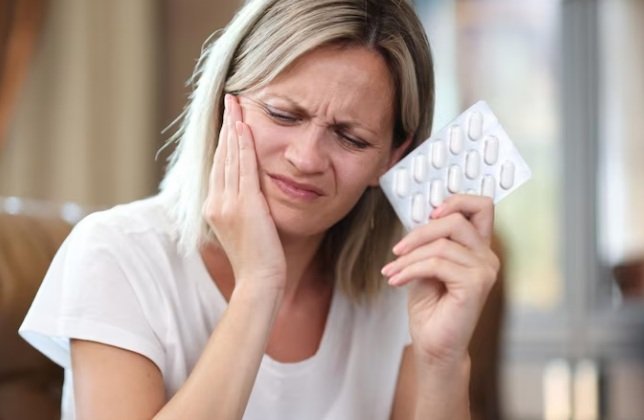Extreme tooth pain can’t sleep is really an issue ,Your asleep may be hampered by the persistent throbbing or pain in your mouth, leaving you sleep-deprived and cranky during the day.
Pain can occasionally be so intense that over-the-counter pain relievers are useless.
Extreme tooth pain can’t sleep:
Numerous factors can contribute to severe tooth pain, including:
- Tooth decay (cavities): When the enamel of your teeth erodes, germs may enter the tooth’s inner layer and produce an infection that may be painful.
- Tooth abscess: This severe infection can develop in the gums or at the tooth’s base. It may result in fever, severe discomfort, and edema.
- Gum disease: This condition develops when plaque and tartar along the gum line accumulate, resulting in swelling and infection.
- Tooth fracture: When you bite down or apply pressure, a cracked or fractured tooth may hurt.
- Tooth sensitivity: This can happen when the outer layer of your teeth’ protective enamel wears away, leaving the inner layer vulnerable to hot and cold temperatures.
- Wisdom tooth impaction: Wisdom teeth not given adequate room to erupt can be painful and uncomfortable.
The underlying cause of your severe tooth pain should be identified and treated by a dentist as soon as possible if you’re suffering from it. Here are some ideas that can provide some comfort for you:
- Over-the-counter painkillers: Ibuprofen or acetaminophen can help lessen pain and swelling associated with teeth.
- Apply a cold compress to the afflicted region for pain relief and reduced edema.
- Saltwater rinse: To assist in easing tooth discomfort and cleaning the afflicted region, rinse your mouth with salt water several times daily.
- Avoid hot or cold drinks and foods: Extreme temperatures should be avoided since they might exacerbate tooth discomfort.
- Maintaining good dental hygiene: To keep your mouth healthy and lower the chance of infection, brush and floss your teeth regularly.
I would advise visiting a dentist as soon as possible if the pain is severe and you cannot get relief from these home cures. They can identify the underlying cause of your discomfort and administer the proper therapy.
How can I sleep with unbearable tooth pain?
if you are asking how can I sleep with unbearable tooth pain , well it is very difficult , but there are several things you can attempt to reduce the pain:
Ibuprofen, acetaminophen, or aspirin are among over-the-counter pain relievers that can aid tooth discomfort. Make careful to adhere to the dosing instructions on the package.
- Apply a cold compress: A cold compress, such as a bag of ice or some frozen vegetables, can help dull the discomfort and lessen swelling by being applied to the afflicted region for 15 to 20 minutes.
- Use a heating pad: Applying a warm, wet compress to the painful region might also assist.
- Rinse your mouth with warm saltwater several times each day to help reduce discomfort and swelling. Combine a teaspoon of salt with a cup of warm water.
- Try an over-the-counter numbing gel: Benzocaine-containing gels are available at your neighborhood pharmacy. Apply a tiny quantity to the gums close to the impacted tooth and teeth for momentary comfort.
- Elevate your head: Try sleeping with an additional pillow or two to prevent your jaw from clenching.
- Maintain excellent sleep hygiene by selecting supporting pillows and a comfy bed. Keep the room quiet and dark; if required, use a white noise machine to help you relax before bed.
My mouth hurts at night but not during the day:
my mouth hurts at night but not during the day , is a common sentence and a question that dentist are asked daily , here are some of the reasons
- Bruxism: Teeth grinding, especially when asleep at night, can hurt and make your teeth and jaw sensitive.
- TMJ: This disorder, which affects the joint that connects the jaw to the skull, results in jaw, face, and neck pain, especially at night while lying down.
- Sleep apnea: This disorder causes a person to repeatedly stop breathing while they sleep, which can cause snoring, choking, or gasping. It may result in headaches, dental sensitivity, and jaw, neck, and head pain.
- Sinusitis: A sinus infection that can result in pressure and discomfort in the face, particularly the jaw, and mouth. When you are lying down, it frequently gets worse.
- Gastroesophageal reflux disease (GERD): GERD is a disorder that causes heartburn and other symptoms when stomach acid backs up into the esophagus. As the acid can erode the enamel of your teeth, it can also result in tooth sensitivity.
- Neuralgia: The trigeminal nerve, which controls feeling in the face and jaw, can be impacted by this form of nerve pain. Particularly at night, it can result in severe, stabbing pain in the mouth and jaw.
- Oral infections: If you have an infection in your mouth, such as a tooth abscess or gum disease, it might hurt and make you uncomfortable, particularly at night when you’re asleep and the afflicted region is relaxed.
- Other variables, such as stress, worry, and some medicines, can contribute to nighttime jaw and mouth discomfort and sleep-related problems. It’s crucial to visit a dentist or doctor if the pain persists or worsens so they can identify the underlying cause and suggest the best course of action.
Your dentist may suggest a mouthguard or splint to wear at night to protect your teeth and jaw if you think you could grind your teeth or have TMJ. They could also suggest an expert to you for additional assessment and care.





